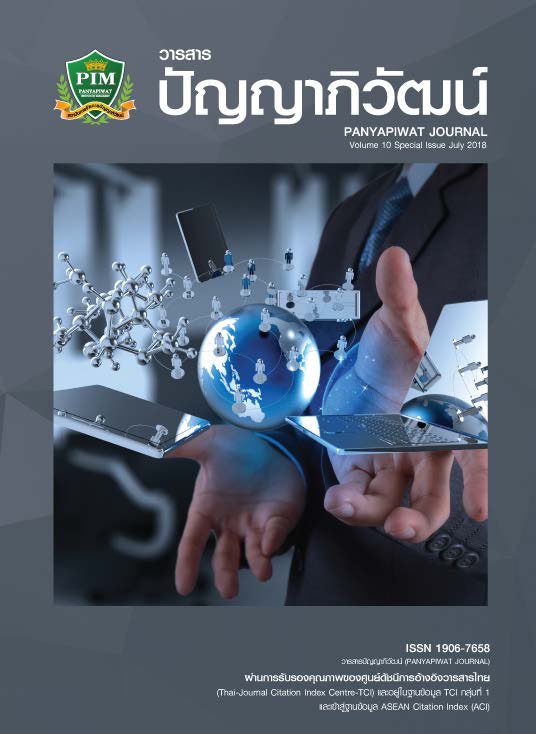การศึกษาปัจจัยเชิงสาเหตุของพฤติกรรมการเล่นเกมออนไลน์อย่างเหมาะสมของนักเรียนชั้นมัธยมศึกษาตอนต้น
Main Article Content
บทคัดย่อ
การวิจัยนี้มีวัตถุประสงค์เพื่อศึกษาความสัมพันธ์โครงสร้างเชิงสาเหตุของปัจจัยที่เกี่ยวข้องกับพฤติกรรมการเล่นเกมออนไลน์อย่างเหมาะสมของนักเรียนชั้นมัธยมศึกษาตอนต้น กลุ่มตัวอย่างที่ใช้ในการวิจัยครั้งนี้ เป็นนักเรียนที่กำลังศึกษาชั้นมัธยมศึกษาตอนต้น โรงเรียนในเขตกรุงเทพมหานคร และเขตปริมณฑล โดยใช้การสุ่มตัวอย่างแบบหลายขั้นตอน (Multistage random sampling) รวม 400 คน เครื่องมือที่ใช้ในการเก็บรวบรวมข้อมูลเป็นแบบวัดตัวแปรเชิงสาเหตุและผลของพฤติกรรมการเล่นเกมออนไลน์อย่างเหมาะสม วิเคราะห์ข้อมูลด้วยวิธีการวิเคราะห์เส้นทาง โดยใช้โปรแกรม AMOS (Analysis for Moment Structure) ผลการวิจัยพบว่า โมเดลความสัมพันธ์เชิงสาเหตุของพฤติกรรมการเล่นเกมออนไลน์อย่างเหมาะสมที่พัฒนาขึ้นมีความสอดคล้องกลมกลืนกับข้อมูลเชิงประจักษ์ตามรูปแบบทฤษฎีปฏิสัมพันธ์นิยม และทฤษฎีต้นไม้จริยธรรม โดยตัวแปรปัจจัยทางจิตสังคม ได้แก่ ตัวแปรกลุ่มสถานการณ์ ตัวแปรจิตลักษณะเดิม และตัวแปรจิตลักษณะตามสถานการณ์ที่นำมาศึกษาในโมเดลส่งผลทางบวกต่อพฤติกรรมการเล่นเกมออนไลน์อย่างเหมาะสม และค่าสัมประสิทธิ์การพยากรณ์ของพฤติกรรมการเล่นเกมออนไลน์อย่างเหมาะสมของนักเรียนชั้นมัธยมศึกษาตอนต้น พบว่า มีค่าเท่ากับ 0.53 กล่าวคือ ตัวแปรปัจจัยทางจิตสังคม สามารถร่วมกันอธิบายความแปรปรวนของพฤติกรรมการเล่นเกมออนไลน์อย่างเหมาะสมของนักเรียนชั้นมัธยมศึกษาตอนต้นได้ร้อยละ 53 อย่างมีนัยสำคัญทางสถิติที่ระดับ .05 โดยพฤติกรรมการเล่นเกมออนไลน์อย่างเหมาะสมขึ้นอยู่กับจิตลักษณะตามสถานการณ์ (เจตคติต่อพฤติกรรมการเล่นเกมออนไลน์อย่างเหมาะสม) มากที่สุด รองลงมาคือ จิตลักษณะเดิมหรือลักษณะภายในตน (ลักษณะมุ่งอนาคตและควบคุมตน) และตัวแปรด้านสถานการณ์ (การควบคุมการเล่นเกมออนไลน์ในครอบครัว) ตามลำดับ โดยทั้งจิตลักษณะเดิมหรือลักษณะภายในตน (ลักษณะมุ่งอนาคตและควบคุมตน) และตัวแปรด้านสถานการณ์ (การควบคุมการเล่นเกมออนไลน์ในครอบครัว) ยังส่งผ่านจิตลักษณะตามสถานการณ์ (เจตคติต่อพฤติกรรมการเล่นเกมออนไลน์อย่างเหมาะสม) เช่นเดียวกัน
Article Details
“ข้าพเจ้าและผู้เขียนร่วม (ถ้ามี) ขอรับรองว่า บทความที่เสนอมานี้ยังไม่เคยได้รับการตีพิมพ์และไม่ได้อยู่ระหว่างกระบวนการพิจารณาลงตีพิมพ์ในวารสารหรือแหล่งเผยแพร่อื่นใด ข้าพเจ้าและผู้เขียนร่วมยอมรับหลักเกณฑ์การพิจารณาต้นฉบับ ทั้งยินยอมให้กองบรรณาธิการมีสิทธิ์พิจารณาและตรวจแก้ต้นฉบับได้ตามที่เห็นสมควร พร้อมนี้ขอมอบลิขสิทธิ์บทความที่ได้รับการตีพิมพ์ให้แก่สถาบันการจัดการปัญญาภิวัฒน์หากมีการฟ้องร้องเรื่องการละเมิดลิขสิทธิ์เกี่ยวกับภาพ กราฟ ข้อความส่วนใดส่วนหนึ่งและ/หรือข้อคิดเห็นที่ปรากฏในบทความข้าพเจ้าและผู้เขียนร่วมยินยอมรับผิดชอบแต่เพียงฝ่ายเดียว”
เอกสารอ้างอิง
Arbuckle, J. L. (2009). AMOS 22.0 User’s Guide. Chicago, IL: SPSS.
Bhanthumnavin, D. (1995). Tree theory, ethics and individual development. Bangkok: Promotion Academic Documents National Institute of Development Administration. [in Thai]
Bhanthumnavin, D. (2000).Ethical tree theory: research and development (2nd ed.). Chulalongkorn University Printing. [in Thai]
Bhanthumnavin, D. (2009). Principles and methods of document processing for excellence in behavioral research (2nd ed.). Bangkok: AA Public Company. [in Thai]
Bhanthumnavin, D. (2015). Antecedents of Mindful Risk-Taking Behavior in Secondary School Students: A Path Analysis Approach. Journal of Behavioral Science, 21(1), 75-94. [in Thai]
Biggins, O. (2009). Building Up the Virtual Community in Online Games and “Onlineaholics” Behaviour of Adolescents in Bangkok Metropolitan. Journal of the Internet, 23(70), 7-21. [in Thai]
Chuchom, O. (2014). Model of causal relationship and effect of teacher commitment. Research Report. Behavioral Science Research Institute, Srinakharinwirot University. [in Thai]
Chula Weekly. (2010). Explore the issue of children addicted to online games in Bangkok, almost 30% into the drugs adversely affect learning and health. The Journal of Chula Weekly, 53(35), 6. [in Thai]
Intune, S. (2009). Psychosocial factors and effects on stress management of reading behavior in adolescent students. M.Sc. (Applied Research Applied Psychology), Behavioral Science Research Institute, Srinakharinwirot University. [in Thai]
Linderman, R. H., Merenda, P. F. & Gold, R, Z. (1980).Introduction to Bivariate and Multivariate Analysis.Glenview, Illinois: Scott, Foresman and Company.
Magnusson, D. & Endler, N. S. (1977). Personality at the Crossroad: Current Issues in Interactionism Psychology. New Jersey: LEA Publisher.
Ministry of Public Health Department of Mental Health, Institute of Mental Health, Children and Teens. (2013). Chart showing percentage of children Game in Thailand. Retrieved November 25, 2017, from https://www.icamtalk.com [in Thai]
Pimthong, S. (2014). A Cross-Cultural Study of Psychosocial Factors Correlated with Sufficient Consumption Behavior of Students in Thailand and Malaysia. Research Report. Behavioral Science Research Institute, Srinakharinwirot University. [in Thai]
Pornnapadol, C., Sornpaisarn, B., Kamkliang, K. & Pattana-amorn, S. (2014). The Development of Game Addiction Screening Test (GAST). J Psychiatr Assoc Thailand, 59(1), 3-14. [in Thai]
Ramasut, P. (2009). Immunization of online games for Thai youth. Bangkok: National Research Council of Thailand. [in Thai]
Saiyot, L. & Saiyot, A. (1985). Principles of educational research. Bangkok: Suksaporn. [in Thai]
Sareerasart, W. (2011). The relationship among social situation and psychological immunity to internet Behavior focusing on safety and usefulness of female students in high schools with and without internet safety project.Master of Science Degree in Applied Behavioral Science Research, Behavioral Science Research Institute, Srinakharinwirot University. [in Thai]
Sennan, T. (2006). Behavior and impact of the game online addiction: case study of student. Thesis, Master of Arts Program in Journalism, Chulalongkorn University. [in Thai]
Sodmanee, A., Yoelao, D., Ginyi, P., Thanachanon, S. & Kateum, P. (2010). Integrative Factors Related to the Ethical Behavior of Community Leaders in the Central Region: Phase.Research Report. Behavioral Science Research Institute, Srinakharinwirot University. [in Thai]
Supaket, P., Munsawaengsub, C., Nanthamongkolchai, S. & Apinuntavetch, S. (2008). Factors Affecting Computer Game Addiction and Mental Health of Male Adolescents in Mueang District, Si Sa Ket Province.Journal of Public Health, 38(3), 317-330. [in Thai]
Tipwareerom, W., Paowattana, A. & Lapwongwattana, P. (2013). Factors Predicting Sexual Risk Behaviors of Adolescent Boys in Phitsanulok Province. Journal of Public Health Nursing, 27(1), 31-45.[in Thai]
Virotvithayagan, C. (2008). Antecedents and Consequences of Sufficient Behavior of Junior Secondary Students in schools with Sufficiencecy Economy Project. Thesis, Master of Arts (Social Development), National Institute of Development Administration.[in Thai]
Vongpinpetch, V. & Vasuwat, C. (2010). The development of the causal relationship model. Of behavior Environmental conservation affecting quality of life of undergraduate students. Chiangmai Province. Research Report No. 237. Chiang Mai: Payap University.[in Thai]
Weiss. (1972). Canonical correlation analysis in counseling psychology. Journal of Counseling Psychology, 19, 241-252.
Wirathchai, N. (1994). Linear Structural Analysis (Lisrel): Analytical Statistics for Social Research and Behavioral Science. Bangkok: Chulalongkorn University Publisher. [in Thai]
Wirathchai, N. (1999). Linear Structural Analysis (Lisrel): Analytical Statistics for Social Research and Behavioral Science. Bangkok: Chulalongkorn University Publisher. [in Thai]
Young, K. S. (2004). Internet Addiction: A new Clinical Phenomenon and Its Consequences. The American Behavior Scientist, 48(4), 402-416.


